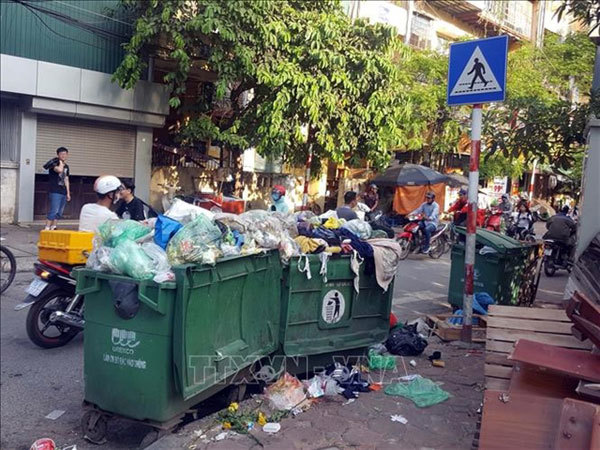the Ministry of Natural Resources and Environment has said.
 |
| Plastic waste has adversely affected the marine life and threatened the living environment. — VNA/VNS Photo |
Minister of Natural Resources and Environment Tran Hong Ha said building policies and legislation for plastic waste was the ministry’s key task to implement the Government’s decision on launching the national action plan for marine plastic waste management.
Under the national action plan for marine plastic waste management, the ministry’s agencies, units, civil servants, officials and employees will participate in recycling, treating and curbing plastic waste use.
Based on these activities, the ministry will work to change public awareness about the impact of environmental pollution by using disposable plastic products and non-biodegradable plastic bags in production activities and daily life.
It will call upon the public to give up the habit of using disposable plastic products and replace plastic bags with environmentally friendly products.
The plan focuses on four targets, including completing policies and legislation on plastic waste management; formulating, implementing and reviewing strategies, projects and some specific tasks; strengthening international co-operation on scientific research, technology application in plastic waste treatment; and raising awareness and changing behaviour towards plastic use.
In terms of building policies and legislation of plastic waste, the Vietnam Environment Administration will be in charge of reviewing and proposing measures to complete regulations on managing re-exported plastic waste or returning imported plastic scrap that does not meet the requirements of environmental protection.
It will work with authorities to develop new environmental criteria for products and plastic bags derived from recycled plastic, products containing micro-plastic particles and nano-resin to prevent negative impacts on human health and the ecological environment.
It will also propose regulations and roadmaps to ban the use of microplastics in the production of cosmetics, garments, and fertilisers.
The ministry will require the administration to chalk out policies to limit single-use plastic production and consumption and to encourage organisations and individuals to classify plastic waste for waste collection and recycling.
The use of plastic products such as single-use plastic bottles, cups and straws in offices or at conferences will be restricted. Waste classification will be implemented at offices.
The administration will be in charge of publishing documents guiding the classification of daily-life solid waste at homes and offices.
In addition, the administration needs to take measures to replace disposable plastic bags with eco-friendly ones at shopping malls and supermarkets by 2026.
The administration will work with ministries and agencies to statistic and classify plastic waste to build a database on registration, declaration, and management of solid waste. VNS

Vietnam warned of failing to implement domestic solid waste treatment plan
The slow development of a waste collection, transport and treatment system in Vietnam is caused mostly by limited financial resources.

“Polluter pays principle” highlighted in VN’s amended Environment Protection Bill
Those who discharge more waste or fail to classify their rubbish could pay higher environmental fees.